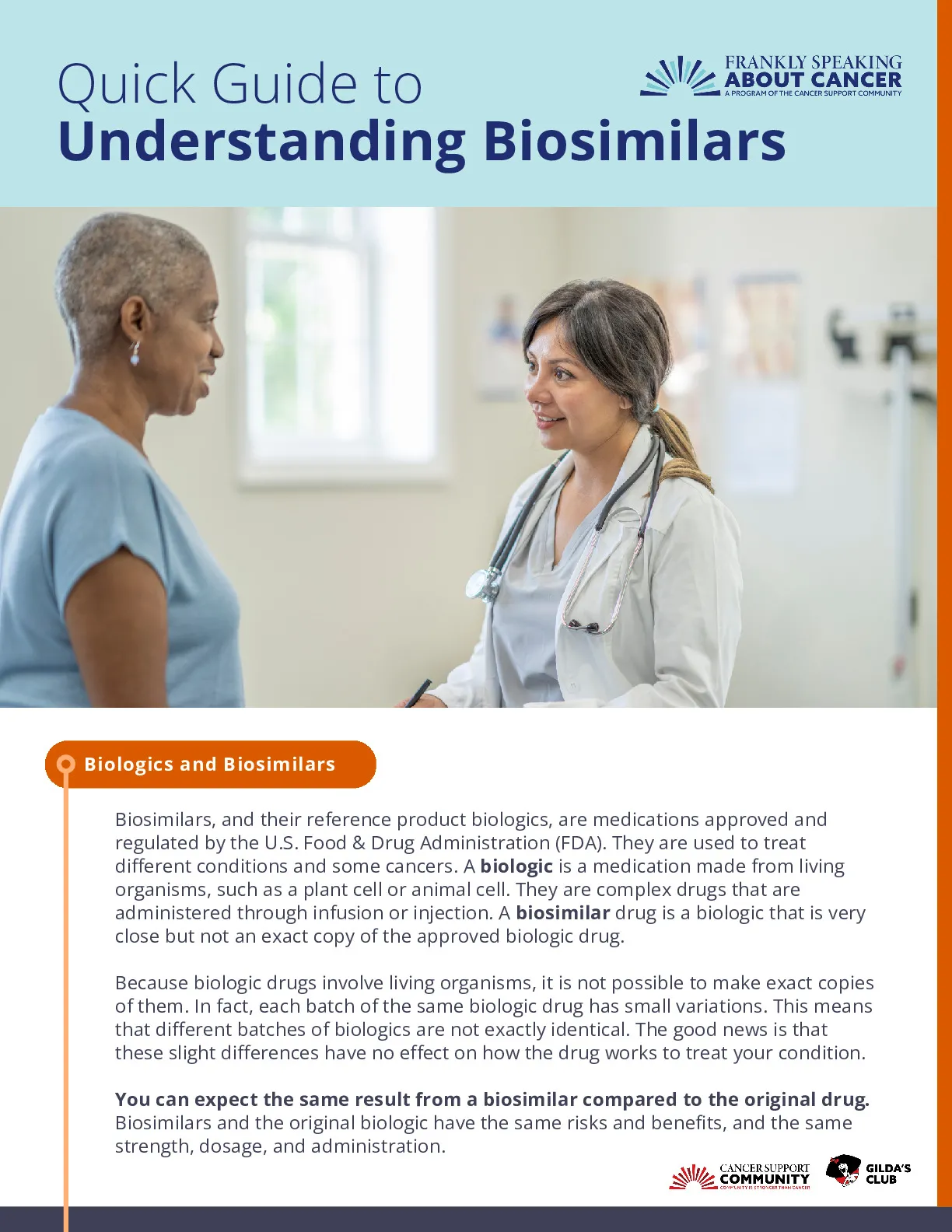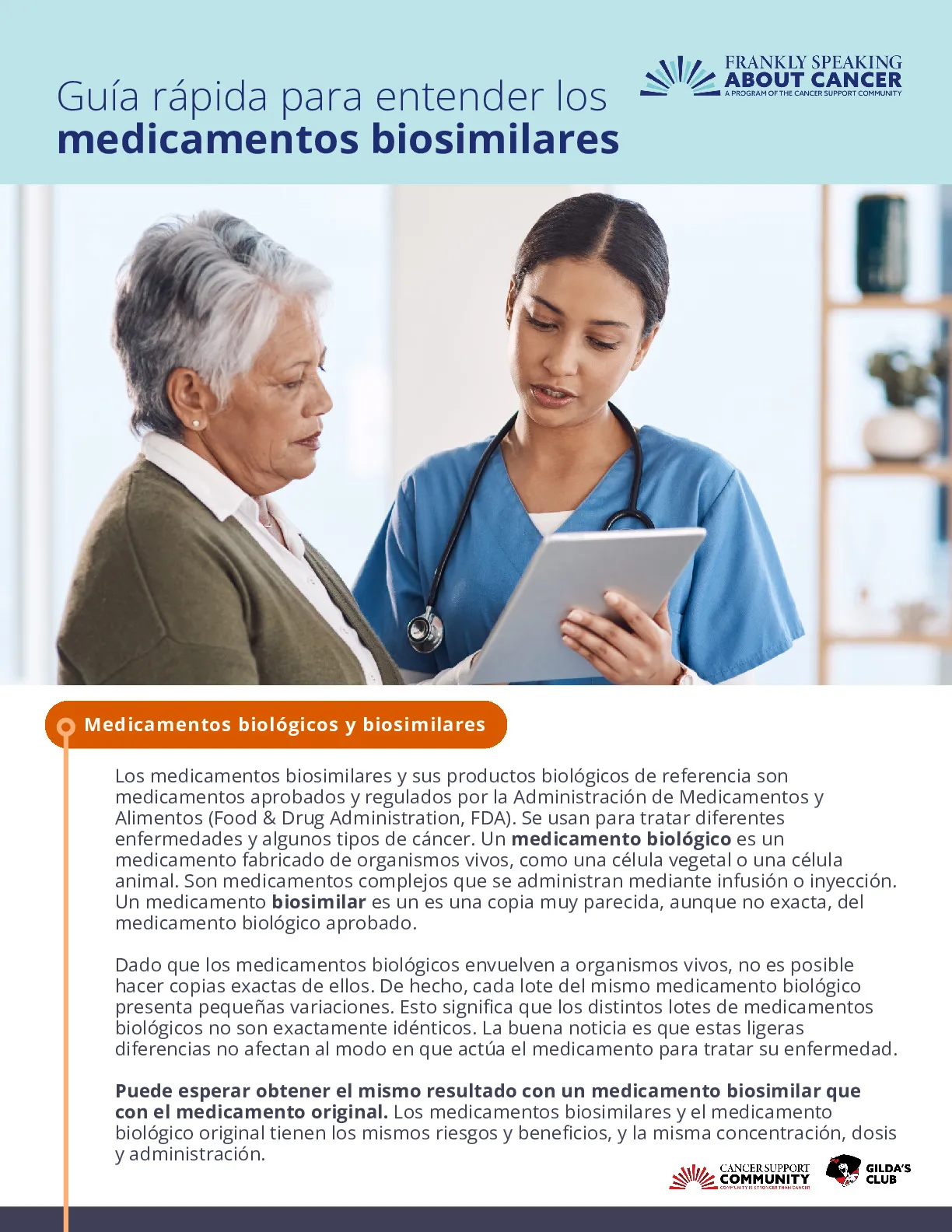What Is a Biosimilar?
Table of Contents
To understand what a biosimilar drug is, you first have to know how drugs are made. You also have to know what a biologic drug is. Many drugs are made from chemicals. Aspirin and chemotherapy are two types of chemical drugs. A biologic drug is made by or from living cells or tissue. Some of the newest drugs used to treat cancer are biologic drugs. This includes immunotherapies and targeted therapies.
Biologic drugs are much larger and more complex than drugs made from chemicals. Because they are so complex, different batches of the same biologic drug have small differences. These differences do not affect how it works in your body.
What is a Biosimilar?
Leah Christl, PhD, former Associate Director, Therapeutic Biologics & Biosimilars at the Food and Drug Administration talks about what biosimilars are.

When a new manufacturer wants to make a copy of a biologic drug, they make a biosimilar—a very similar copy of the original biologic drug. In the same way that each batch of biologic drugs is very similar to the others, biosimilars are also very similar to the original biologic drug.
Biosimilars work the same way in your body, are just as safe, and have the same potential side effects as their original drug.

Learn More About Biosimilars
Watch our Facebook Live about biosimilar drugs. CSC’s Rachel Saks, Senior Director of Education, and Dr. Sandra Cuellar, Clinical Associate Professor in the Department of Pharmacy Practice at the University of Illinois, Chicago College of Pharmacy, discuss the role of biologics in cancer treatment, what biosimilar drugs are, and how they are modeled on original biologic drugs.
Biologic Drugs That Treat Cancer
A biologic drug is made by or from living cells or tissue. Some of the newest drugs used to treat cancer are biologic drugs. This includes some immunotherapies—treatments that use the body’s natural defenses to identify, attack, and kill cancer cells. It also includes some targeted therapies—cancer treatments that target a specific change in some cancers that helps them grow, divide, and spread. These drugs include:
- Bevacizumab (Avastin®)—Used to treat brain, colorectal, lung, ovarian, and certain other cancers
- Cetuximab (Erbitux®)—Used to treat colorectal and head and neck cancers
- Trastuzumab (Herceptin®)—Used to treat HER2+ breast and gastric cancers
- Rituximab (Rituxan®)—Used to treat certain types of blood cancers
Biologic drugs are more difficult and more expensive to make than drugs made out of chemicals. It is impossible to make an exact copy of a biologic drug. But a very similar copy can be made. A biosimilar drug is a very similar copy of an already approved biologic drug. Biosimilars work the same way as biologics in your body. They are also just as safe. A patient who is treated with a biosimilar drug can expect the same results they would receive from a biologic drug.

How Is a Biosimilar Approved?
Before a doctor can prescribe a drug in the U.S., it must be approved by the Food and Drug Administration (FDA). A generic drug is an exact copy of a brand name chemical drug that has already been approved by the FDA. Since it is an exact copy, the FDA does not require new clinical studies for a generic drug to get approved. This is one reason why generic drugs cost less than brand name drugs.
Before the FDA approves a biosimilar, the drug must go through a series of tests. They include some clinical studies. These tests must show that the biosimilar is:
- As safe as the original drug
- As effective (works as well) as the original drug
- Used in the same way
- Made at the same dose and strength
- Used to treat some of the same diseases
- Going to have the same potential side effects
Drug Names
All chemical drugs have two names—a brand name and a generic name. For example, Tylenol is the brand name for the drug acetaminophen. Biologic drugs also have brand names and generic names. For example, Neupogen® is the brand name for the biologic drug filgastrim. A biosimilar will have a different brand name than its original biologic drug. But it will have the same generic name as the original drug. The name is followed by a dash and four letters selected at random by the FDA. For example, filgrastim-sndz (Zarxio®) is a biosimilar for filgrastim (Neupogen®). Both drugs are used in the same way, at the same dose, have the same potential side effects, and work equally well.
Your Prescription
If you are prescribed a chemical drug, a pharmacist can give you the brand name drug or the generic drug. That’s because both drugs are the exact same chemical. If you are prescribed a biologic drug, a pharmacist cannot give you a biosimilar instead of the original drug without your doctor’s consent. That’s because the drugs are very similar but not exactly the same.
Your insurance may cover the original biologic drug. Or, they may cover the biosimilar. The retail price for a biosimilar may be about 10-30% less than the original drug. But that doesn’t mean the biosimilar will always be less expensive. Talk to an oncology social worker, financial navigator, or another member of your cancer care team. They can see if you qualify for a patient assistance program that may provide you with the original biologic or the biosimilar at a lower price.
If you need your prescription changed to a biosimilar for insurance purposes, your pharmacist may need to notify your doctor and you before they can switch. Laws vary by state. Check with your pharmacist if you need your prescription changed.
Quick Guide to Biosimilars
In this Quick Guide to Biosimilars, you'll learn what biosimilars are and how they're being used in cancer care.
Frankly Speaking About Cancer Library
LibraryWould you like a print copy of these educational materials?
We can mail our Frankly Speaking About Cancer pieces to you. Shipping is free for up to 20 pounds.

